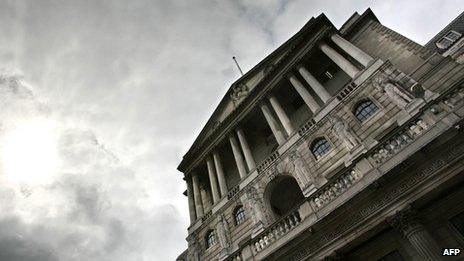Did the Bank of England cry wolf?
- Published
- comments

The Bank of England made history over the autumn and earlier this year.
Its newly created Financial Policy Committee announced that the big UK banks were short of capital to protect themselves against potential future losses and then quantified that gap as £25bn that needed to be raised by the end of this year.
Never before had any British regulator, let alone the Bank of England, been so public and explicit about the weaknesses it perceived in the banking system.
The expectation was created that dramatic evasive action would be taken to mend our banks - especially the two perceived to be weakest, Royal Bank of Scotland (RBS) and Lloyds.
In the event, after weeks of negotiation with their day-to-day supervisor, the Prudential Regulation Authority, RBS and Lloyds won their argument that there isn't some great black hole in either of them.
They both won the right to continue what they had already been doing to strengthen themselves - namely to offload non-essential assets and shrink riskier activities.
But nothing symbolically important is being sold that wasn't going to be sold anyway.
And - most significantly - the most dramatic thing any bank can to do raise capital, namely to sell new shares, isn't deemed to be necessary (and see my note of yesterday for more).
Which rather creates the impression that the seemingly dire warnings of the Bank of England and its soon-to-retire governor, Sir Mervyn King, about the capital shortages in UK banks were either a bit overdone or haven't been followed through effectively.
Whichever version of events is correct, neither burnishes the Bank of England's reputation as it flexes its newly acquired powers to boss the banks.
The notion that the Bank of England can be a bit alarmist about the health of the banking system has the potential to confuse bank customers, at a time when their confidence is still dented from the great crisis of 2007-8.
And the alternative view - that the banks still aren't recovered properly but remain brilliant at running rings around their supervisor and disguising the extent of their weakness - well that would be more disturbing.
The credibility of banks and of central banks, such as the Bank of England, is more or less all they have. So when the credibility of the regulated and the regulator rub up against each other, as seems to have happened, that is not altogether benign.